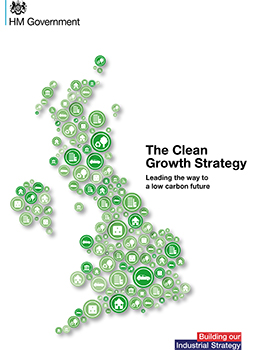Clean Growth Strategy: Much to praise but many aspirations rather than tangible policy commitments

The Government’s new Clean Growth Strategy, published yesterday, recognises that the transition to low-carbon growth should be at the heart of the UK’s economy over the next few decades, bringing greater prosperity, higher living standards and enhanced wellbeing.
The need to reduce emissions is greater than ever, but what used to be perceived as a constraint is becoming the driver of future growth. Important technologies are getting cost competitive and countries, cities and businesses around the world are taking action, increasing the global demand for low-carbon goods and services.
So far, the UK’s ambitious plans under the Climate Change Act have given the UK a head start, boosting low-carbon innovation and making the UK a world-leader in emerging low-carbon technologies. Last month the latest auction of “contracts for difference” indicated that offshore wind technologies have developed much faster than expect and may soon no longer require subsidies to overcome the market failures to compete on a level playing field with incumbent fossil fuels. With the global export market for low-carbon goods and services expected to be worth £1.0–1.8 trillion a year, seven to 12 times more than today, by 2030, the UK’s strengths in low-carbon innovation represent significant opportunities to boost UK trade post Brexit.
Minister Claire Perry told the BBC’s Today Programme this morning that the UK needed to ‘capture this enormous opportunity’ as the ‘whole world pivots towards low-carbon and BEIS pointed out the UK’s economy is already benefiting for being at the forefront of decarbonisaion. As BEIS tweeted this morning – emissions have dropped by 40% since 1990 and during that time the UK’s economy has grown by two thirds.
While the Strategy shows that the government recognises the opportunities clean growth has to offer the UK, the only way to reap the benefits of decarbonisation is with strong and ambitious policy.
Making the transition to a low-carbon economy will require mobilising large amounts of private sector funding for infrastructure and emerging technologies. For example, in the energy sector alone, achieving the National Grid ‘Gone Green’ scenario for 2030 would require a 60–70% increase above 2012 levels of investment, or about £12 billion per annum in total. To achieve this level of funding the government will need to encourage private sector investment which will encourage innovation and increase competitiveness.
Though the UK has a strong long-term climate policy framework unanticipated policy reversals have created uncertainty for investors in the past. In 2015 the new government rolled back a raft of green policies. The result is that there is currently a dearth of planned renewable energy projects in the National Infrastructure and Construction Pipeline, equivalent to a 95% drop in investment in 2020/2021 compared with 2017/2018.
It is good news that the new Clean Growth Strategy signals a strong commitment to decarbonisation, however there are also many aspirations rather than tangible policy commitments.
For instance the Strategy is notably vague on industrial energy efficiency. Significantly the Strategy is also missing some key elements, such as how the government proposes to establish a sufficiently strong carbon price before and after Brexit.
While the UK has performed well in cutting emissions so far, more ambition and more certainty is needed to accelerate the UK’s decarbonisation.
The UK is not currently on track to achieve the reductions in emissions required by the 4th budget or the 5th budget, which was passed into law in June 2016. The 4th budget which requires cuts in emissions reductions of 51% by 2027. The Committee on Climate Change, which monitors UK emissions, reported in early 2017 that emissions in 2015 were only 38% below 1990 levels.
Without policies to make more ambitious reductions the UK will be unable to meet this legally binding target and will lose its lead in the transition towards a low-carbon economy.
The Clean Growth Strategy is a good start. It must be supported by a strong Industrial Strategy (the white paper for which is expected later this year) if the UK is to capitalise on the enormous opportunities clean growth presents.

